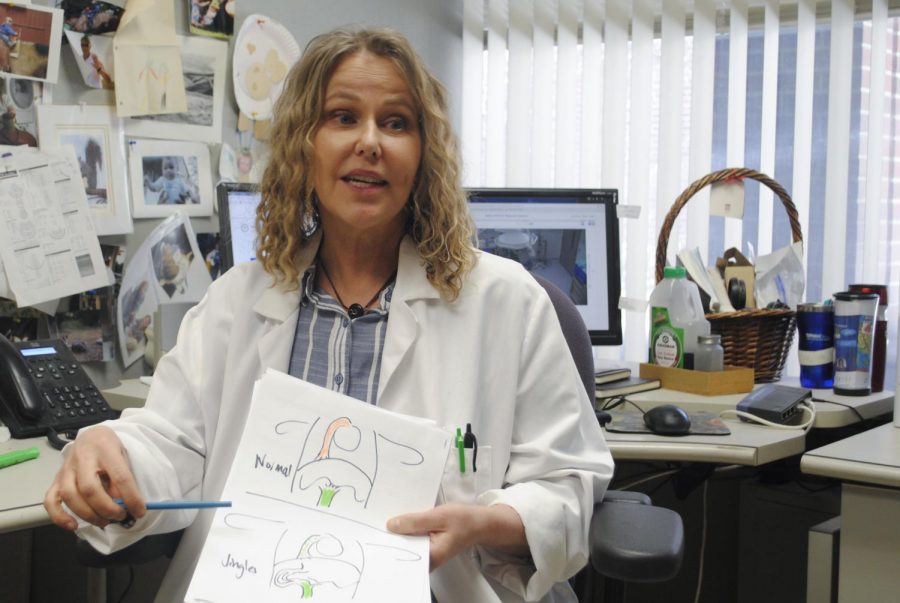WSU veterinarians help aid Jingle the corgi
Rescue organization launched campaign for donations, raised $6,000
ALYSSA STANFIELD | THE DAILY EVERGREEN
Dr. Boel Fransson describes the surgery on Jingle’s liver shunts with a small sketch she drew out on Monday at WSU’s Veterinary Teaching Hospital. Fransson says Jingle’s condition was more difficult than an average dog.
April 3, 2019
Veterinarians at WSU took a chance on Jingle, a 5-month-old male Corgi puppy suffering from multiple liver shunts.
“We were the service that saw Jingle originally for his illness,” said Dr. Jillian Haines, a veterinarian and assistant professor in the Department of Veterinary Clinical Sciences. “I also helped facilitate the relinquishment of him to the rescue organization, Rescue4All, that ultimately took over his care.”
Haines said Rescue4All specializes in treating pets with special needs.
The organization caters to animals in the shelter system that may be in danger of euthanasia, according to the Rescue4All website. Rescue4All is based in Spokane and is entirely funded by public donations.
Haines said Jingle had a CT scan, which showed that he had multiple, big liver shunts. Liver shunts occur when the blood bypasses the liver and does not get filtered, so toxins end up in the heart and brain and cause clinical issues like seizures.
“When he came to us, he was very small, weighed only about 8 pounds and was a quiet, sad little guy,” she said.
Haines said Rescue4All launched a campaign to get donations for Jingle’s procedure. In 48 hours, they raised over $6,000.
She said social media played a role in having people from all over the world donate to Jingle’s cause.
“I was involved in this because I am the one who performs surgeries similar to this one, but Jingle’s was a bit more difficult than the average dog,” said Dr. Boel Fransson, a veterinarian and professor in the Department of Veterinary Clinical Sciences.
Fransson said dogs are sometimes diagnosed with one, big shunt, but Jingle had a couple of major shunts and a number of smaller ones.
“We were so happy that interventional radiologist Dr. Smith from Spokane offered his services [and] donations via materials that were needed for this difficult type of procedure,” she said.
Haines said Jingle was sick to the point that the food he was eating was toxic to him.
“There are only a couple of surgeons who deal with these types of difficult shunts,” Fransson said. “We were going to have them go to a place that specialized in shunts like these, but it would have been too complex, and the cost would have been too high.”
Fransson said they performed a non-invasive procedure to block off the big shunts in Jingle.
“Though we have helped him, Jingle is not cured and will need to have checkups for the rest of his life, but he has no more obvious clinical signs,” she said.
Haines said this procedure extended Jingle’s lifespan significantly.
“Jingle is now with a couple who are supporters of the Rescue4All organization,” she said. “It is safe to say that he has a forever home.”










